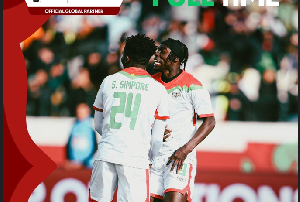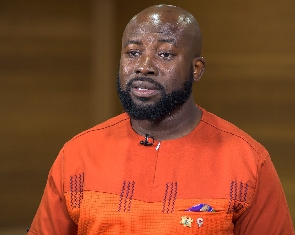Angry customers of defunct Goldman Capital, one of the collapsed financial institutions affected by the ongoing banking sector reforms, are beating war drums over their locked up deposits at Bank of Ghana.
"We are by this, serving notice and giving two weeks ultimatum to government for a quick response and to correct the situation or else customers of the collapsed 347 microfinance companies will hit the street to demand our hard earned investments", they warned.
They have accordingly descended heavily on officials of Bank of Ghana for shortchanging them in the process of cleaning up the financial space in the country.
They have again given government two weeks ultimatum to rescind decisions made on the payment plan or incur their displeasure.
"It can not be that we have our legitimate huge investment locked up somewhere whilst we wallow in terminal abject poverty. Our children have been sacked from schools. Customers have been ejected from their homes because they owe rents whilst others have been bedridden with sickness because of locked-up funds. Pensioners who invested in the company have been rendered poorer and nearer to their graves. Still, others have their businesses shut down due to locked-up funds at Goldman Capital", they lamented.
According to the aggrieved investors, instead of paying all their locked up deposits at Goldman Capital as promised by the central bank, and the receiver Price Water House Cooper, the highest amount been offered was 10,000 Ghana cedis irrespective of the investment made by the customers.
As a result, they want President Akufo-Addo to intervene in the matter for BoG and the receiver to reverse the payment plan considering its negative consequences on their investment.
The Bank of Ghana revoked the licenses of 347 microfinance companies, declaring them insolvent.
The shutdown took immediate effect in May 2019. The licenses of 192 were revoked in addition to 155 that had already been declared incapacitated and therefore ceased operations.
Goldman capital, one of the affected companies which had its main operations centered in Tarkwa Nsuaem Municipality in Western Region, was also declared insolvent by the central bank.
Following the closure of the company, affected customers were assured of payment of their locked up deposits by the central bank which carried out the shutdown of the financial firm.
Surprisingly, more than a hundred members of the aggrieved customers of Goldman capital in Tarkwa, organized a press conference to press home demand for the immediate release of their locked up investment at Bank of Ghana.
Majority of these aggrieved customers who are miners and had worked with Goldfields Ghana Limited were affected by redundancy carried out last year by the mining company.
According to them, when they received their severance packages in monetary value, they decided to invest the money at Goldman Capital while expecting future yields.
Unfortunately, the company they trusted with their investment, was subsequently declared insolvent by the central government.
Speaking at the press conference, spokesperson of the group, Richard Hasford, explained that the genesis of their predicaments started when after four months of closure of the financial institution nothing was heard again.
"Customers of Goldman Capital Ghana regret the attitude of government and the receiver Mr. Eric Nipa in handling the locked up investment after the revocation of license of the company by Bank of Ghana (BoG)", he said.
"This is because during the revocation of the license, government assured customers that it has secured enough funds to pay off all depositors with the company. However our checks with Price Water House and Bank of Ghana indicate different and conflicting stories", he explained.
Following that, he said the affected customers had to impress upon the receiver to pay them their locked up investment and they started the process this month.
Shockingly, he said whether one invested 100,000, 200,000, or above, the central bank and the receiver decided to pay 10,000 as the highest for those who invested above 10,000.
"To our dismay, the receiver Eric Nipa ended up paying only ten thousand (GH 10,000) to customers even if your investment is one million Ghana cedis. Customers find this situation highly unacceptable and a betrayal of the trust and mandate given to the receiver. As customers, our investment is our life and blood and our dependence on it is not negotiable", he stressed.
The aggrieved customers questioned government officials on the following "What is the basis for the current woefully payment? Why did government take payment from Goldman Capital? How much was released for payment?
What happened to the said 23 billion cedis that was released".
According to Hasford, government must consider the plight of the aggrieved customers, and review the payment plan.
This is because, he, like all other aggrieved customers, believe, the payment plan been offered by the receiver, was certainly not what was agreed upon by the parties when officials of Price Water House Cooper engaged them.
Some of the affected customers who shared their plight contended they were extremely disappointed in the central bank and government officials in the manner they were handling the issue.
"Government is hereby called upon to do the needful by ensuring that the 23 billion we were told has been secured is made available for payment. We do not want to believe that customers were misled into believing that a payment by BoG, through the receiver was better than the payment which was being done by Goldman Capital investment", they said.
For spouses of these affected customers, family management has been badly affected following the collapse of the financial institution and the decision by the receiver to pay just a paltry sum of the compensation due them instead of reasonable amounts to cushion them rather amounted to wickedness.
Meanwhile, the angry customers have cautioned government appointees meddling in the financial breakdown to consider the political consequences of their actions today, against decision making of the Ghanaian electorates in 2020.
Most of the ongoing decisions adopted to clean up the financial space, they argue, appear detrimental to the survival of thousands of indigenous businesses and enterprises in the country.
General News of Saturday, 21 September 2019
Source: Daniel Kaku















